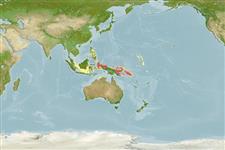>
Eupercaria/misc (Various families in series Eupercaria) >
Labridae (Wrasses)
Etymology: Leptojulis: Greek, leptos = thin + Greek, ioulis, a fish dealing with genera Coris or Thalassoma (Ref. 45335).
More on author: Randall.
Environment: milieu / climate zone / depth range / distribution range
पारिस्थितिकी
समुद्री ड़िमरसल; गहराई सीमा 20 - 46 m (Ref. 12420). Tropical
Western Pacific: Solomon Islands, Papua New Guinea, and Indonesia.
आकार / वज़न / Age
Maturity: Lm ? range ? - ? cm
Max length : 10.0 cm TL पुल्लिंग / अलिंग; (Ref. 48636)
पृष्ठीय रीढ़ (सम्पूर्ण) : 9; पृष्ठीय सौफट रेज़ (सम्पूर्ण) : 11; गुदा कांटा: 3; ऐनल सौफट रेज़: 11. A slender finely-scaled species with a distinct small black spot on side, at eye level, just past the pectoral fin (Ref. 48636).
Found solitary or in small groups (Ref. 90102) on coastal slopes with sparse reef formation, inhabiting the open areas (Ref. 48636); also on silty sand or mud bottoms. Feeds on benthic crustaceans (other stomach contents were polychaete remains and fish scales) (Ref. 12420).
Life cycle and mating behavior
Maturities | पुनरुत्पत्ति | Spawnings | Egg(s) | Fecundities | लार्वा
Oviparous, distinct pairing during breeding (Ref. 205).
Randall, J.E., 1996. Second revision of the labrid fish genus Leptojulis, with descriptions of two new species. Indo-Pac. Fish. (24):20 p. (Ref. 12420)
IUCN Red List Status (Ref. 130435)
Threat to humans
Harmless
Human uses
साधन
Special reports
Download XML
इंटरनेट स्रोत
Estimates based on models
Preferred temperature (Ref.
123201): 28 - 28.1, mean 28.1 °C (based on 3 cells).
Phylogenetic diversity index (Ref.
82804): PD
50 = 0.5312 [Uniqueness, from 0.5 = low to 2.0 = high].
Bayesian length-weight: a=0.00955 (0.00456 - 0.02002), b=3.06 (2.89 - 3.23), in cm total length, based on LWR estimates for this (Sub)family-body shape (Ref.
93245).
Trophic level (Ref.
69278): 3.7 ±0.54 se; based on food items.
लौटाव (Ref.
120179): ऊंचा, न्यूनतम जनसंख्या दुगनी समय अवलागत 15 महीने। (Preliminary K or Fecundity.).
Fishing Vulnerability (Ref.
59153): Low vulnerability (10 of 100).
